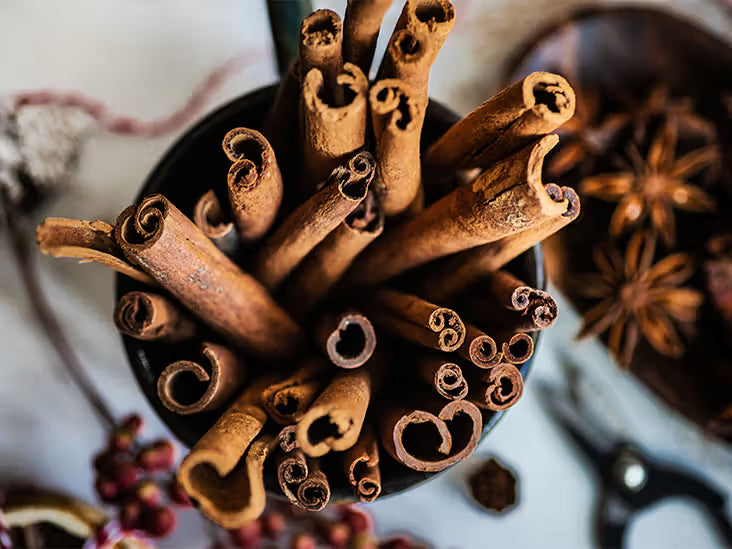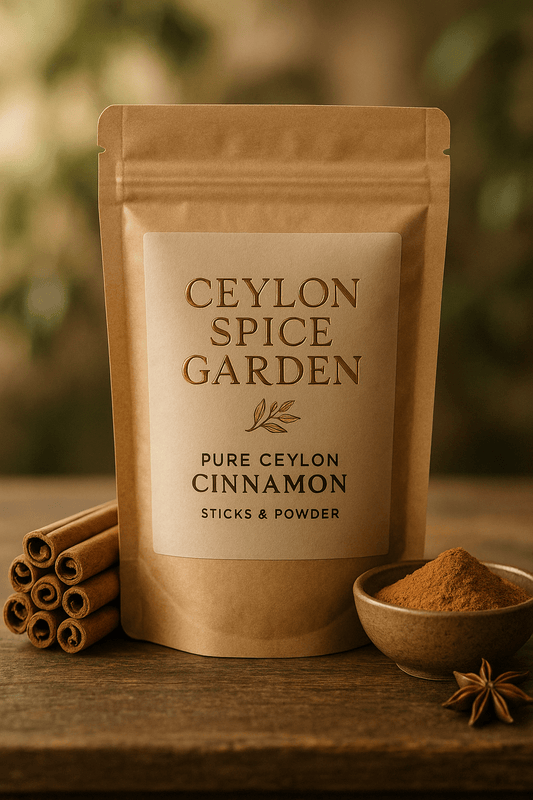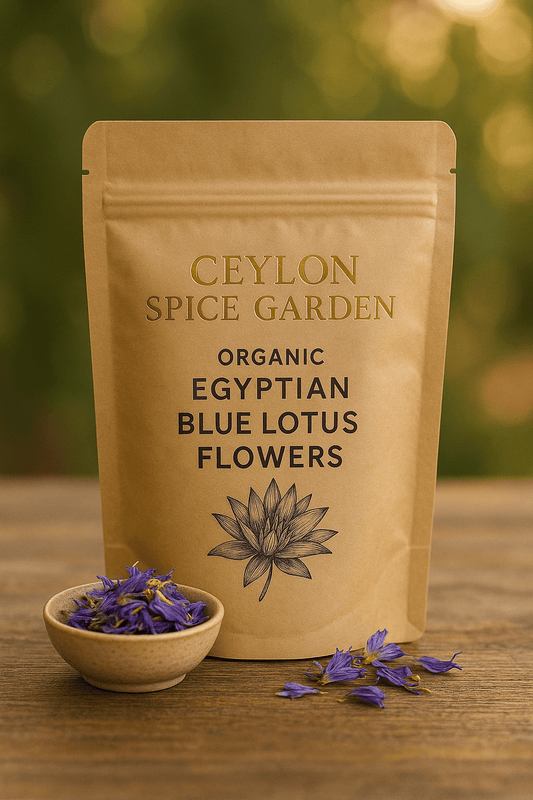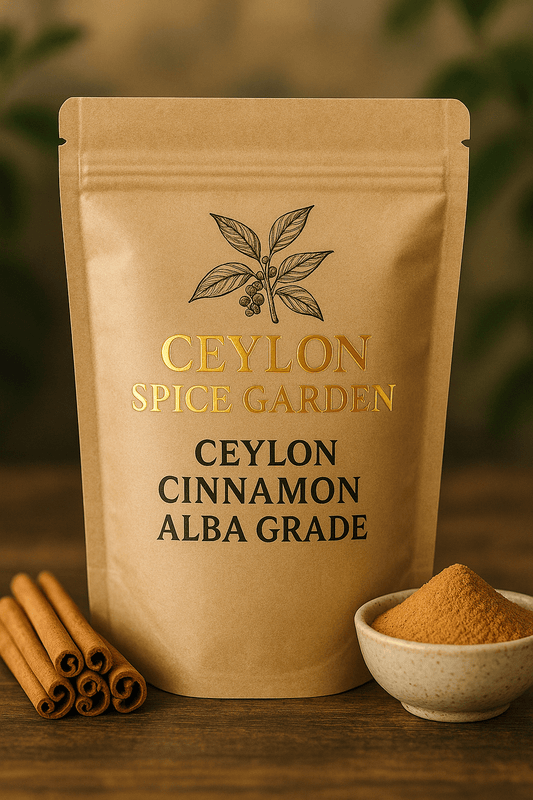
Ceylon Cinnamon Sticks Buying Guide: How to Choose the Best in 2025
Ceylon Cinnamon Sticks Buying Guide: How to Choose the Best in 2025
Table of Contents
- What Makes Ceylon Cinnamon Special
- How to Identify Authentic Ceylon Cinnamon Sticks
- Understanding Ceylon Cinnamon Quality Grades
- Ceylon vs Cassia: The Critical Differences
- Key Factors When Buying Ceylon Cinnamon
- Where to Buy Authentic Ceylon Cinnamon
- Proper Storage for Maximum Freshness
- Ceylon Cinnamon Pricing Guide 2025
- Common Buying Mistakes to Avoid
- Health Benefits of Choosing Ceylon Over Cassia
- Frequently Asked Questions
What Makes Ceylon Cinnamon Special
Ceylon cinnamon, scientifically known as Cinnamomum verum, is the only true cinnamon in the world. Originating exclusively from Sri Lanka's southwestern regions, this premium spice has been treasured for over 2,000 years for its delicate flavor and remarkable health properties.
According to research published in the National Institutes of Health, Ceylon cinnamon contains significantly lower levels of coumarin compared to Cassia cinnamon, making it safer for regular consumption. The European Food Safety Authority recommends Ceylon cinnamon for daily use due to its minimal coumarin content.
Why Ceylon Cinnamon Commands Premium Prices
- Labor-intensive harvesting process requiring skilled craftsmen
- Limited growing region (only southwestern Sri Lanka)
- Complex processing that takes 2-3 days per batch
- Delicate flavor profile that's irreplaceable in fine cooking
- Superior health benefits with minimal side effects
How to Identify Authentic Ceylon Cinnamon Sticks
Visual Identification Techniques
Authentic Ceylon cinnamon sticks have distinct visual characteristics that set them apart from inferior alternatives:
- Thin, papery layers: Multiple thin layers (8-10) rolled together, creating a telescope-like appearance
- Light brown color: Tan to light brown exterior, never dark reddish-brown
- Smooth texture: Relatively smooth surface without thick, coarse bark
- Brittle consistency: Breaks easily when bent, unlike tough Cassia sticks
- Uniform diameter: Typically 6-10mm in diameter, consistent throughout
The Aroma and Taste Test
Ceylon cinnamon's aroma is distinctly sweet and delicate, with subtle citrusy notes. When tasted, it should be mildly sweet without the sharp, spicy bite characteristic of Cassia cinnamon. The flavor is complex yet gentle, making it suitable for both sweet and savory applications.
Understanding Ceylon Cinnamon Quality Grades
Sri Lankan cinnamon is graded according to traditional standards established by generations of spice traders. Understanding these grades helps you choose the right quality for your needs and budget.
| Grade | Diameter | Length | Quality | Best Use | Price Range |
|---|---|---|---|---|---|
| Alba (00000) | 6mm | 42 inches | Highest | Premium cooking, gifts | $$$ |
| Continental (0000) | 8mm | 42 inches | Excellent | Fine baking, beverages | $$$ |
| Mexican (000) | 10mm | 42 inches | Very Good | General cooking | $$ |
| Hamburg (00) | 12mm | 30 inches | Good | Commercial use | $$ |
| C5 Special | 15mm | 30 inches | Standard | Budget cooking | $ |
For most home cooks, Continental (0000) or Mexican (000) grades offer the best balance of quality and value. Professional bakers and gourmet enthusiasts often prefer Alba grade for its exceptional flavor profile.
Ceylon vs Cassia: The Critical Differences
Understanding the differences between Ceylon and Cassia cinnamon is crucial for making an informed purchase. While both are sold as "cinnamon," they're entirely different species with distinct characteristics.
Health Impact Comparison
The most significant difference lies in coumarin content. Studies show that Cassia cinnamon contains 200-250 times more coumarin than Ceylon cinnamon. High coumarin intake can potentially cause liver damage with regular consumption.
- Ceylon cinnamon: 0.004% coumarin content - safe for daily use
- Cassia cinnamon: Up to 1% coumarin content - requires moderation
Culinary Applications
Ceylon cinnamon's delicate, sweet flavor makes it ideal for:
- Fine pastries and desserts
- Coffee and tea blends
- Fruit dishes and compotes
- Savory Middle Eastern and Indian cuisines
- Health-focused recipes and supplements
Learn more about the culinary applications in our complete baking guide.
Key Factors When Buying Ceylon Cinnamon
Origin Verification
Authentic Ceylon cinnamon can only come from Sri Lanka. Look for clear labeling that specifies "Product of Sri Lanka" or similar origin indicators. Be wary of products labeled simply as "Ceylon cinnamon" without origin details.
Packaging and Freshness
Quality Ceylon cinnamon should be packaged in airtight containers or sealed bags that protect from light and moisture. Check for:
- Recent harvest or packing dates
- Protective packaging (aluminum-lined bags, dark containers)
- Minimal broken pieces (indicates careful handling)
- Strong, pleasant aroma when opened
Certifications to Look For
Important Certifications
- Organic certification: USDA Organic, EU Organic, or equivalent
- Fair Trade certification: Ensures ethical sourcing
- ISO 22000: Food safety management
- HACCP compliance: Hazard analysis and critical control points
- Ceylon Cinnamon Association: Industry verification from Sri Lanka
Where to Buy Authentic Ceylon Cinnamon
Trusted Online Sources
Specialized spice retailers and direct importers often provide the highest quality Ceylon cinnamon. Look for companies that:
- Specialize in Sri Lankan spices
- Provide detailed product information and grading
- Offer money-back guarantees on authenticity
- Have transparent sourcing information
- Display proper certifications and test results
Physical Store Considerations
When buying from physical stores:
- Choose stores with high spice turnover for freshness
- Ask to examine the sticks before purchasing
- Verify the country of origin on packaging
- Compare prices across different stores
Proper Storage for Maximum Freshness
Proper storage significantly impacts Ceylon cinnamon's flavor retention and shelf life. Follow these guidelines to maintain quality:
Storage Environment
- Temperature: Cool, consistent temperature (60-70°F ideal)
- Humidity: Low humidity environment (under 60%)
- Light: Dark storage location away from direct sunlight
- Air exposure: Airtight containers to prevent oxidation
Container Selection
Best Storage Containers
- Glass jars with airtight lids
- Food-grade aluminum containers
- Vacuum-sealed bags for long-term storage
- Original packaging if properly sealed
Properly stored Ceylon cinnamon sticks maintain optimal flavor for 2-3 years, though they're best used within 18 months for maximum potency.
Ceylon Cinnamon Pricing Guide 2025
Ceylon cinnamon pricing varies significantly based on grade, quantity, and source. Understanding fair market prices helps you identify genuine products and avoid overpaying.
Price Ranges by Grade (per pound)
- Alba Grade: $45-65
- Continental Grade: $35-50
- Mexican Grade: $25-40
- Hamburg Grade: $20-30
- C5 Special: $15-25
Bulk Purchase Benefits
Purchasing larger quantities often reduces per-unit costs, but ensure you can use the product within its shelf life. Many suppliers offer volume discounts for purchases over 5-10 pounds.
Common Buying Mistakes to Avoid
Mistake #1: Focusing Only on Price
While price is important, the cheapest option is rarely authentic Ceylon cinnamon. Quality Ceylon cinnamon requires significant investment in sourcing, processing, and handling.
Mistake #2: Ignoring Origin Information
Always verify that the product specifically states it originates from Sri Lanka. Terms like "Ceylon-style" or "Ceylon-type" often indicate imitations.
Mistake #3: Buying Without Visual Inspection
When possible, examine the cinnamon sticks visually. The multi-layered, light-colored appearance is unmistakable in authentic Ceylon cinnamon.
Mistake #4: Overlooking Freshness Indicators
Old cinnamon loses its potent aroma and flavor. Always check harvest or packaging dates and opt for more recent products.
Mistake #5: Purchasing from Unverified Sources
Stick to reputable suppliers who can provide authenticity guarantees and proper documentation of origin.
Health Benefits of Choosing Ceylon Over Cassia
The health advantages of Ceylon cinnamon extend beyond its low coumarin content. Research published in Pharmacognosy Research highlights Ceylon cinnamon's unique therapeutic properties.
Key Health Advantages
- Blood Sugar Management: Studies show Ceylon cinnamon helps regulate blood glucose levels
- Cardiovascular Health: May support healthy cholesterol levels
- Weight Management: Can be part of an effective weight loss strategy
- Stress Relief: Natural compounds may help with stress management and better sleep
- Blood Pressure Support: Research indicates potential cardiovascular benefits
Expert Insight
As Ceylon's leading spice experts with over 25 years of experience, Ceylon Spice Garden has worked directly with Sri Lankan cinnamon farmers and processors. Our expertise comes from hands-on knowledge of authentic Ceylon cinnamon production, quality assessment, and the health research surrounding this remarkable spice.
Making Your Ceylon Cinnamon Purchase Decision
Choosing authentic Ceylon cinnamon sticks requires attention to detail, but the investment in quality pays dividends in flavor, health benefits, and culinary satisfaction. Remember to prioritize authenticity over price, verify origin claims, and purchase from trusted sources that stand behind their products.
Whether you're a professional chef, health-conscious consumer, or culinary enthusiast, authentic Ceylon cinnamon sticks will elevate your cooking while providing peace of mind about safety and quality.
Frequently Asked Questions
Authentic Ceylon cinnamon has multiple thin, papery layers rolled together, a light tan to brown color, and a delicate, sweet aroma. It should break easily when bent and have "Product of Sri Lanka" clearly labeled on the packaging. Avoid thick, dark reddish-brown sticks which are typically Cassia cinnamon.
Ceylon cinnamon grades are based on diameter and length. Alba (00000) is the highest grade with 6mm diameter, while C5 Special is the most affordable at 15mm diameter. Higher grades have more delicate flavor and command premium prices. For most home cooking, Continental (0000) or Mexican (000) grades offer excellent quality.
Yes, Ceylon cinnamon's superior safety profile (low coumarin content), delicate flavor, and health benefits justify the price difference. Regular cinnamon (Cassia) contains 200-250 times more coumarin, which can be harmful with regular consumption. Ceylon cinnamon is safe for daily use and offers unique culinary properties.
Store Ceylon cinnamon sticks in airtight containers in a cool, dark, dry place. Glass jars or food-grade aluminum containers work best. Keep away from direct sunlight, heat, and moisture. Properly stored Ceylon cinnamon maintains optimal flavor for 2-3 years, though it's best used within 18 months for maximum potency.
The best sources are specialized spice retailers who import directly from Sri Lanka, reputable online spice companies with authenticity guarantees, and stores that specialize in South Asian ingredients. Always verify the product states "Product of Sri Lanka" and avoid suspiciously cheap prices which often indicate Cassia cinnamon substitutions.
Yes, but Ceylon cinnamon has a more delicate, sweet flavor compared to the stronger, spicier Cassia cinnamon. You might need to use slightly more Ceylon cinnamon to achieve the same flavor intensity. It's excellent for fine baking, beverages, and dishes where you want subtle cinnamon notes without overpowering other flavors.
Due to its low coumarin content, Ceylon cinnamon is safe for daily consumption in normal culinary amounts (1-2 teaspoons daily). Unlike Cassia cinnamon, which should be limited due to high coumarin levels, Ceylon cinnamon poses minimal health risks even with regular use. However, always consult healthcare providers for therapeutic dosing.
Ceylon cinnamon sticks have a shelf life of 2-3 years when properly stored in airtight containers away from light, heat, and moisture. However, for optimal flavor and potency, use within 18 months of purchase. The aroma test is reliable - if the cinnamon has lost its distinctive sweet fragrance, it's time to replace it.
Whole Ceylon cinnamon sticks maintain freshness and potency much longer than ground powder. Sticks can be ground as needed for maximum flavor impact. However, for convenience in baking and cooking, high-quality ground Ceylon cinnamon from reputable sources is acceptable. Learn more in our powder vs sticks comparison guide.











